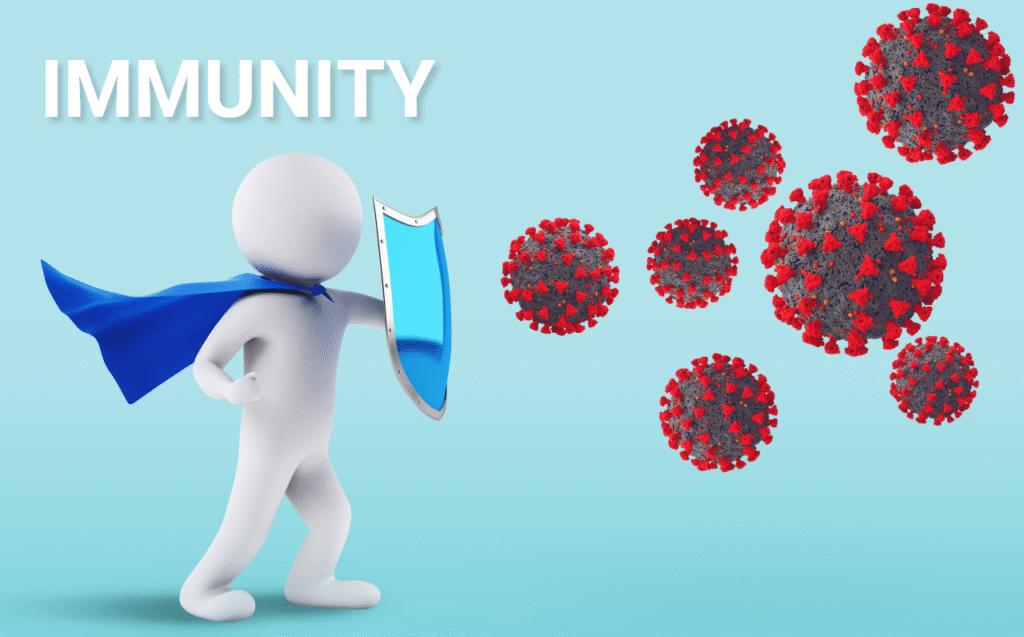The immune system acts as your body’s personal bodyguard, an intricate network that shields you from illness, heals wounds, and keeps you functioning at your best. However, like any system, it requires ongoing care and the right support to perform optimally. Without proper attention, the immune system can become weakened, leaving you vulnerable to infections and diseases.
In today’s world, factors like processed foods, high stress, and constant digital distractions often take a toll on our immune health. Fortunately, you don’t have to rely on medications or complex routines to strengthen your immunity. By making small but impactful lifestyle changes, such as adopting a nutrient-rich diet, practicing stress-reduction techniques, and incorporating holistic practices, you can naturally boost your immune system. This guide offers simple, effective strategies to help you support your body’s defense system and maintain its resilience, ensuring that your immune system stays strong and ready to protect you.
💪 The Immune System: A Quick Refresher

Think of your immune system as a highly skilled army, tirelessly defending your body around the clock. This intricate network is made up of white blood cells, antibodies, the lymphatic system, and even your skin and mucous membranes, all working in harmony to spot and eliminate harmful invaders like viruses, bacteria, and parasites.
A healthy, strong immune system is able to detect potential threats early and respond quickly, keeping you protected from illness and disease. When your immune defenses are operating at their peak, they act swiftly and efficiently to maintain your well-being.
However, when the immune system becomes weakened—whether due to chronic stress, lack of sleep, poor nutrition, or exposure to toxins—it can’t function as effectively. This creates a vulnerability, making it easier for harmful pathogens to invade and cause illness.
The key to maintaining a strong immune system is not just about boosting it in times of illness or crisis. It’s about consistently supporting it with healthy habits, like proper rest, a balanced diet, and stress management, to keep it performing at its best all year round.
🥦 Eat for Immunity: Superfoods That Strengthen Your Defenses
🍊 Load Up on Vitamin C
Vitamin C is widely recognized as one of the most effective immune-boosting nutrients. It plays a crucial role in supporting the immune system by stimulating the production and function of white blood cells, which are essential for identifying and attacking harmful invaders like viruses and bacteria. Additionally, Vitamin C acts as a powerful antioxidant, helping to protect the body from oxidative stress.
Oxidative stress occurs when there’s an imbalance between free radicals (unstable molecules) and antioxidants in the body, leading to cellular damage. By neutralizing these free radicals, Vitamin C helps reduce inflammation and supports overall immune function, ensuring your body is better equipped to fend off infections and stay healthy.
- Best sources: Oranges, strawberries, bell peppers, kiwi, and broccoli.
- Tip: Vitamin C is water-soluble, so your body doesn’t store it. Eat it daily!
🧄 Garlic: Nature’s Antibiotic
Garlic contains allicin, a potent compound known for its immune-boosting and antimicrobial properties. Research shows that people who regularly consume garlic experience fewer colds and recover more quickly. Its ability to enhance immune function and fight off infections makes garlic a natural, effective way to support overall health and strengthen your body’s defenses.
- Crush garlic and let it sit for 10 minutes before eating—it activates the enzymes.
🫐 Berries & Antioxidants
Berries such as blueberries, elderberries, and raspberries are packed with flavonoids, a type of antioxidant that promotes immune cell health. These antioxidants help protect cells from damage, reduce inflammation, and support the body’s natural defense mechanisms. Regularly consuming these nutrient-rich berries can boost your immune system and contribute to overall well-being.
- Elderberry syrup is a popular natural remedy for cold and flu symptoms.
🌰 Zinc-Rich Foods
Zinc plays a crucial role in immune cell communication, helping the body coordinate an effective immune response. A deficiency in zinc can impair this communication, leading to a weakened immune system and an increased susceptibility to infections. Ensuring adequate zinc intake is essential for maintaining optimal immune function and protecting the body from illness.
- Top sources: Pumpkin seeds, lentils, chickpeas, nuts, oats, and whole grains.
💤 Sleep: Your Immune System’s Reset Button

Sleep is essential for maintaining a strong immune system—it’s not just a luxury. During rest, your body produces cytokines, which are proteins that help fight inflammation and infection. These cytokines play a key role in regulating the immune response, ensuring your body can efficiently ward off pathogens and heal. Consistently getting enough quality sleep is crucial for allowing your immune system to function at its best, reducing the risk of illness and supporting overall health.
- Adults need 7–9 hours per night.
- Even one night of poor sleep can reduce your body’s ability to fight viruses.
Create a Sleep-Friendly Routine:
- Wind down with calming tea like chamomile.
- Avoid screens 1 hour before bed.
- Stick to a consistent sleep schedule—even on weekends.
Sleep debt is cumulative. Make quality rest a priority to give your immune cells the recovery time they need.
🧘♀️ Stress Less, Defend More
Chronic stress raises cortisol levels, which can suppress immune function and promote inflammation. This weakened immune response makes the body more vulnerable to illness, while the increased inflammation can contribute to various health issues. Managing stress is essential for maintaining a healthy immune system and reducing inflammation.
The Cortisol-Immunity Connection:
- Prolonged cortisol elevation can lower white blood cell count.
- This reduces the effectiveness of your body’s immune response to infections.
Natural Stress-Busters:
- Mindfulness & Meditation: Just 10 minutes a day can make a difference in reducing stress and enhancing overall well-being.
- Exercise: Physical activity helps lower cortisol levels, improves mood, and strengthens the immune system.
- Laughter: It’s not just fun—it actually reduces stress hormones and improves immune function, helping your body stay strong.
🏋️♀️ Move Your Body (But Don’t Overdo It)
Moderate exercise offers significant benefits for immune health. It enhances circulation, allowing immune cells and vital substances to move freely throughout the body. This improved blood flow helps strengthen the immune response by ensuring that white blood cells and other immune components can efficiently reach areas in need of protection or repair. Regular, moderate physical activity not only boosts immunity but also supports overall health, reducing the risk of illness and improving your body’s ability to fight infections.
Best Forms of Immune-Boosting Movement:
- Brisk walking, cycling, swimming, dancing.
- Aim for 30 minutes of moderate activity, 5 times a week.
Avoid Overtraining:
- Excessive or intense exercise without rest can increase inflammation and suppress immunity.
🌞 Soak Up the Sun (Or Supplement Vitamin D)

Vitamin D is crucial for activating the body’s immune defenses. It aids in the production of antimicrobial peptides, which help combat viruses and bacteria. By enhancing the immune system’s ability to fight infections, vitamin D plays a key role in maintaining overall health and reducing the risk of illness, especially during colder months.
- Sunlight Exposure: Aim for 10–20 minutes of sunlight on your face, arms, and legs daily to get adequate vitamin D.
- Food Sources: Include fatty fish, fortified dairy, mushrooms, and egg yolks in your diet for natural vitamin D.
- Supplements: If you live in a region with limited sunlight, consider taking vitamin D3 supplements—just make sure to check your levels with a blood test first.
🧴 Keep It Clean—But Not Too Clean
Hygiene is important, but excessive use of antibacterial soaps and sanitizers can disrupt the balance of good microbes on your skin. Over time, this can weaken your immune system by reducing the diversity of beneficial bacteria that help protect against harmful pathogens. A more balanced approach to cleanliness, without over-sanitizing, allows your immune system to function properly while still keeping harmful germs in check.
Healthy Hygiene Habits:
- Wash hands with soap and water, avoiding harsh chemicals.
- Only use antibiotics when prescribed and avoid overuse.
- Allow children to play and get dirty—exposure to microbes helps strengthen their immune system.
Probiotics:
- Include probiotic-rich foods such as yogurt, kefir, kimchi, and miso in your diet.
- A healthy gut supports a strong and responsive immune system.
🧠 Gut Health = Immune Health
Did you know that nearly 70% of your immune system lives in your gut?
Your gut microbiome, made up of trillions of bacteria, plays a key role in regulating inflammation, digestion, and immune function. When this delicate balance is disrupted, it can negatively affect your immune response, making it harder for your body to fight off infections and maintain overall health. Supporting a healthy gut microbiome is essential for a well-functioning immune system and overall well-being.
How to Improve Gut Health:
- Eat Prebiotics: Include garlic, onions, leeks, asparagus, and bananas to nourish beneficial gut bacteria.
- Reduce Sugar & Processed Foods: Cut back on sugar and ultra-processed foods, as they feed harmful bacteria.
- Fermented Foods: Incorporate fermented foods to restore healthy bacteria and support digestion.
🌿 Herbal Allies: Natural Immunity Boosters from Nature
Herbs have been used for centuries to support immunity, with many still recognized for their healing properties today. Modern science has also validated the effectiveness of certain herbs, reinforcing their role in boosting the immune system.
Top Herbal Immune Boosters:
- Echinacea: Helps reduce the severity and duration of cold symptoms.
- Astragalus: A traditional Chinese herb known to enhance immune function.
- Elderberry: Contains antiviral properties that assist in fighting the flu and colds.
- Turmeric: Curcumin, its active compound, combats inflammation and oxidative stress.
💧 Hydrate to Help Your Immune System Flow

Water is essential for overall health, including your immune system. Proper hydration aids in the production of lymph, which transports immune cells throughout the body, helping your immune system function effectively and respond to infections more efficiently.
Daily Hydration Tips:
- Aim for 8–10 glasses of water daily to stay hydrated.
- Add citrus, cucumber, or herbs to your water for flavor and added nutrients.
- Avoid sugary drinks, as they can dehydrate you and weaken your immune response.
🚭 Avoid These Immunity Busters
Just as you can support immunity, you can unknowingly sabotage it.
Top Immunity Killers:
- Smoking: Damages the lungs and reduces white blood cell count, weakening immunity.
- Excess Alcohol: Disrupts gut health and impairs immune function.
- Poor Sleep & High Stress: Suppress the body’s immune response.
- Processed Foods: High in sugar and low in nutrients, negatively affecting gut health and immunity.
🧬 Bonus: Biohack Your Immunity (Advanced Tips)
If you’re ready to take your immune health to the next level, these advanced tips could provide the boost you’re looking for, helping you optimize your body’s defenses even further.
💡 Try These Immune Biohacks:
Cold Exposure (cold showers, ice baths): May activate immune cells and help reduce inflammation.
Intermittent Fasting: Stimulates autophagy (cellular repair) and supports immune regeneration.
Red Light Therapy: Some studies suggest it reduces inflammation and enhances cellular energy.
Grounding (walking barefoot on natural ground): Thought to help lower inflammation and stress.
🧭 Final Thoughts: Your Immunity Is in Your Hands
You don’t need prescriptions or extreme changes to strengthen your immune system. The key lies in making small, consistent adjustments to your everyday habits. Simple actions like eating a balanced diet, staying hydrated, exercising regularly, getting enough sleep, and managing stress can gradually improve your immune function. Over time, these positive habits accumulate, helping to boost your body’s natural defenses. Additionally, incorporating nutrient-rich foods, practicing mindfulness, and maintaining a healthy lifestyle can provide lasting benefits for your immune system. By focusing on these manageable changes, you’re giving your body the support it needs to stay strong, resilient, and better equipped to fight off infections and illnesses. Consistency is the key to long-term immune health.
- Eat real food.
- Sleep like it matters.
- Move your body.
- Manage your stress.
- Nurture your gut.
You don’t need to be perfect—just mindful. Start with one or two habits, build momentum, and watch your resilience grow.
FAQs
1. How can I naturally boost my immune system?
You can naturally boost your immune system by eating a balanced diet rich in vitamins and minerals, staying hydrated, getting regular exercise, reducing stress, and getting adequate sleep. Including probiotic-rich foods, like yogurt, and managing your stress levels can also support immune function.
2. How does stress affect my immune system?
Chronic stress raises cortisol levels, which can suppress immune function and increase inflammation, making you more vulnerable to illness. Managing stress through mindfulness, exercise, and relaxation techniques can help maintain a strong immune system.
3. How much sleep do I need for optimal immune health?
Aim for 7-9 hours of quality sleep each night. During sleep, your body produces cytokines, which are proteins that help fight infection and inflammation, supporting overall immune function.
4. Can taking vitamin C help prevent illness?
Vitamin C can support your immune system by promoting the production of white blood cells and acting as an antioxidant to protect against oxidative stress. While it may not prevent illness entirely, it can help reduce the severity and duration of colds.
5. What are some foods that can boost immunity?
Foods rich in vitamins and minerals, such as citrus fruits, garlic, ginger, spinach, and berries, can support immune health. Including probiotic-rich foods like yogurt and fermented items like kimchi and miso can also strengthen your immune system.
